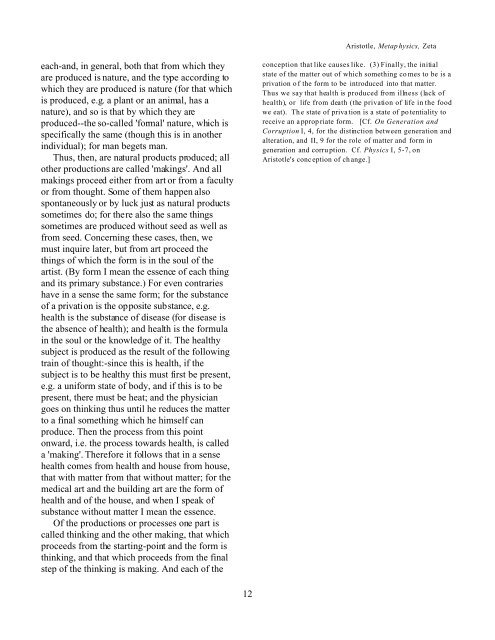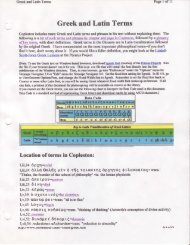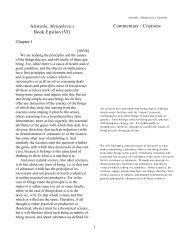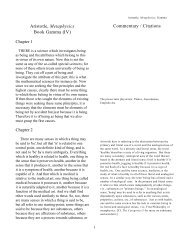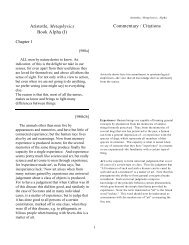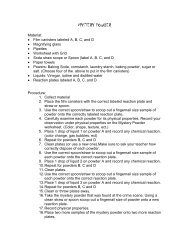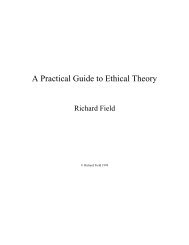Aristotle, Metaphysics Book Zeta (VII) Commentary ... - CATpages
Aristotle, Metaphysics Book Zeta (VII) Commentary ... - CATpages
Aristotle, Metaphysics Book Zeta (VII) Commentary ... - CATpages
You also want an ePaper? Increase the reach of your titles
YUMPU automatically turns print PDFs into web optimized ePapers that Google loves.
<strong>Aristotle</strong>, <strong>Metaphysics</strong>, <strong>Zeta</strong><br />
each-and, in general, both that from which they<br />
are produced is nature, and the type according to<br />
which they are produced is nature (for that which<br />
is produced, e.g. a plant or an animal, has a<br />
nature), and so is that by which they are<br />
produced--the so-called 'formal' nature, which is<br />
specifically the same (though this is in another<br />
individual); for man begets man.<br />
Thus, then, are natural products produced; all<br />
other productions are called 'makings'. And all<br />
makings proceed either from art or from a faculty<br />
or from thought. Some of them happen also<br />
spontaneously or by luck just as natural products<br />
sometimes do; for there also the same things<br />
sometimes are produced without seed as well as<br />
from seed. Concerning these cases, then, we<br />
must inquire later, but from art proceed the<br />
things of which the form is in the soul of the<br />
artist. (By form I mean the essence of each thing<br />
and its primary substance.) For even contraries<br />
have in a sense the same form; for the substance<br />
of a privation is the opposite substance, e.g.<br />
health is the substance of disease (for disease is<br />
the absence of health); and health is the formula<br />
in the soul or the knowledge of it. The healthy<br />
subject is produced as the result of the following<br />
train of thought:-since this is health, if the<br />
subject is to be healthy this must first be present,<br />
e.g. a uniform state of body, and if this is to be<br />
present, there must be heat; and the physician<br />
goes on thinking thus until he reduces the matter<br />
to a final something which he himself can<br />
produce. Then the process from this point<br />
onward, i.e. the process towards health, is called<br />
a 'making'. Therefore it follows that in a sense<br />
health comes from health and house from house,<br />
that with matter from that without matter; for the<br />
medical art and the building art are the form of<br />
health and of the house, and when I speak of<br />
substance without matter I mean the essence.<br />
Of the productions or processes one part is<br />
called thinking and the other making, that which<br />
proceeds from the starting-point and the form is<br />
thinking, and that which proceeds from the final<br />
step of the thinking is making. And each of the<br />
conception that like causes like. (3) Finally, the initial<br />
state of the matter out of which something comes to be is a<br />
privation of the form to be introduced into that matter.<br />
Thus we say that health is produced from illness (lack of<br />
health), or life from death (the privation of life in the food<br />
we eat). The state of privation is a state of po tentiality to<br />
receive an appropriate form. [Cf. On Generation and<br />
Corruption I, 4, for the distinction between generation and<br />
alteration, and II, 9 for the role of matter and form in<br />
generation and corruption. Cf. Physics I, 5-7, on<br />
<strong>Aristotle</strong>'s conception of change.]<br />
12


